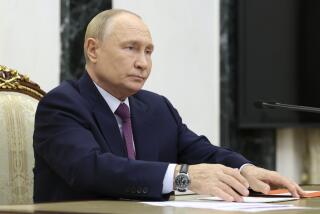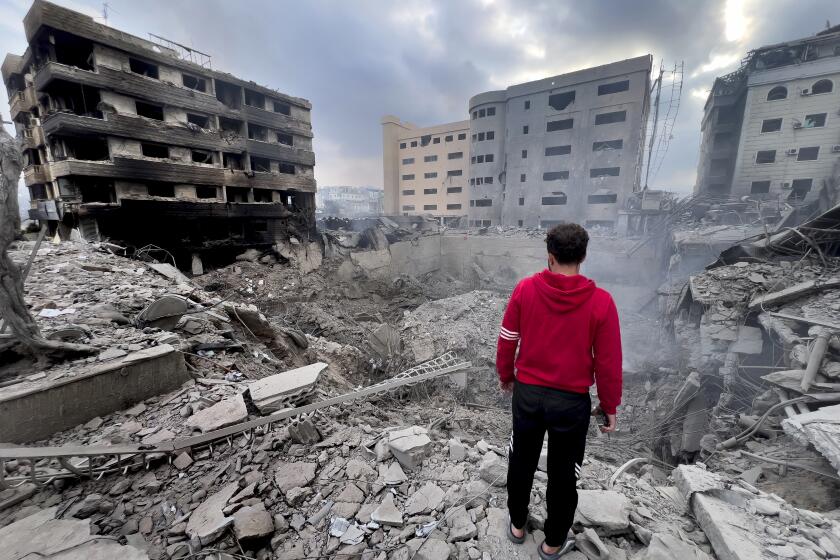As Summit Ends, No Firm Nuclear Strategy Devised
Deeply concerned that the “nuclear tide” has turned in the wrong direction for the first time in nearly a decade, leaders of eight of the world’s most powerful nations struggled Sunday to devise a plan to stop a new nuclear arms race.
But after the final session of a three-day summit here, they conceded that they had not developed a clear strategy for how to deal with the problem, and British Prime Minister Tony Blair expressed frustration at the lack of available options.
In a separate meeting, President Clinton and Russian President Boris N. Yeltsin agreed that one step they can take to try to discourage India and Pakistan from conducting nuclear tests is to expedite work on nuclear weapons reduction treaties. But domestic obstacles in Russia seemed a significant obstacle to that effort.
India’s nuclear tests last week and worries that Pakistan would follow suit overshadowed the scheduled topics at the annual meeting of the Group of 8. The group comprises the long-standing Group of 7 industrial powers--the United States, Britain, Canada, France, Germany, Italy and Japan--plus Russia.
White House officials stressed that the timing of the meeting--in the wake of India’s explosions--again attested to the wisdom of holding such annual gatherings to find common approaches to international problems, both immediate and long-term.
But the attendees’ failure to decide on a forceful strategy to address the threat to international security posed by India’s nuclear tests seemed to show the impotence of the group despite the weighty credentials of its members.
Instead of coalescing around a plan to force India back into the mainstream, the leaders on Friday issued a toothless statement condemning the Indian explosions and asserting that the action affected each of their relationships with the South Asian nation.
But asked Sunday whether the summit leaders felt powerless in the face of the world’s mounting crises, French President Jacques Chirac defended the forum and its proclamations.
“It’s easy to say that,” the French president retorted. “But one would be wrong to do so. . . . When the eight leading powers of the world speak out through diplomatic channels, without giving lessons to the entire world in an arrogant manner, I do not believe this is something negligible.”
With conflicting news reports out of the Pakistani capital, Islamabad, on Sunday--some quoting Pakistani officials declaring that they had decided to conduct a nuclear test--the G-8 leaders returned again to the problem of preventing an escalation of the arms race, at least in South Asia.
“The worst conceivable result would be for everybody that’s ever worked on [nuclear explosions] to think they ought to conduct some sort of test and that this is now sort of a new measure of either national security or national greatness,” Clinton told reporters after the conclusion of the summit and his consultations with Yeltsin. “I’m going to spend a lot of time thinking through this and coming up with an affirmative strategy to try to deal with . . . all the aspects of the problem.”
Clinton stressed how urgent it is to “turn the nuclear tide back in the right direction, away from more weapons to fewer.”
At a closing news conference, Blair gave a grim assessment of how India’s tests had changed the world: “There is no doubt at all that the decision by India has greatly weakened the security of the world.”
Adherence to Test-Ban Treaty Is the Objective
The leaders agreed that their goal is to persuade India and Pakistan to adhere to the 1996 Comprehensive Test Ban Treaty, but the leaders and their representatives appeared to have few ideas of how to ensure that outcome. India has consistently refused to participate in any nonproliferation or test-ban treaties until the five declared nuclear powers (Britain, France, the U.S., China and Russia) first agree to a timetable to give up their nuclear arms.
“There is a sense of frustration about what has happened,” Blair said. “But there is also the determination that we must have a strategy. And the best strategy, I have no doubt at all, is to make the demand to India very, very clearly that they come into the CTBT process and do so unconditionally.”
Blair said that Indian Prime Minister Atal Behari Vajpayee has assured him that New Delhi will enter discussions immediately on joining that process.
“In the end, this is the only thing that is going to mitigate what is a very, very serious problem,” Blair said.
Clinton Hopes to Revive START II Talks
The Indian tests provided Clinton with a new lever to try to press Russia to ratify START II, the second phase of the international nuclear weapons reduction effort that sets targets of reducing the two countries’ nuclear arsenals by two-thirds from Cold War heights.
“Both agreed that this latest episode underscores the special responsibility that the United States and Russia, as custodians of significant nuclear arsenals, have to continue the task of reducing those arsenals,” Deputy Secretary of State Strobe Talbott said.
Although START II has been signed and ratified by the United States, progress has been stalled because Russia’s Duma, the lower house of parliament, has for five years resisted endorsing it. Nonetheless, Yeltsin offered Clinton hope that the Duma might take action this summer.
“He will not only push for its ratification, but argue that it ought to be considered in an even more timely fashion now because of the Indian test,” Clinton said.
Yeltsin was asked as he stepped into his limousine for the ride to Birmingham airport how he could be so confident of getting Duma ratification of the arms treaty that has languished so long.
“I’ll get them to do it,” he said knowingly. “They’ll get the hint.”
As soon as Start II is agreed upon, Clinton said, he feels confident that the two nations can move quickly on START III, the framework for deeper cuts that Yeltsin and Clinton agreed upon 14 months ago in Helsinki, Finland.
“I think all of us, because of the India nuclear tests, feel an even greater sense of urgency to change the debate again over nuclear issues,” Clinton said.
‘A Pile of Problems to Deal With’
The lack of progress on disarmament has created an obstacle that has prevented the superpower rivals from meeting in a full-fledged summit for more than two years.
Yeltsin made it clear that he is eager for another. After his 45-minute meeting with Clinton, Yeltsin declared the talks friendly but unsatisfying in their brevity when so many urgent issues confront their countries.
“It was just a fleeting interval, and we have such a pile of problems to deal with,” Yeltsin said.
“What can you get done in an hour? You just tick off the problems--this, that, the other thing,” he observed, punctuating his complaint with a dismissive wave. “We need to move forward. We’ve defined the course.”
In an example of what has become his trademark penchant for exaggerated statements and gestures on the world stage, Yeltsin told journalists just before he left Birmingham that Clinton will be coming to Russia for a summit in two months.
“He’ll come to us in July, and then we will sit down together for 15 hours and get something done,” an animated Yeltsin insisted, showing little sign of the fatigue that forced him to miss a musical program Saturday in order to rest.
Yeltsin spokesman Sergei V. Yastrzhembsky quickly moved to recast the president’s announcement as what the Kremlin would like to see happen this summer, rather than a formal agreement to meet.
“The Duma meets in June, and [Yeltsin] believes a summit in July would be a very good thing,” the Kremlin spokesman told journalists moments after Yeltsin’s announcement in front of TV cameras. “As far as I know, Clinton is not against this. But no START, no start of meeting.”
Yeltsin Appears to Be in Better Health
The meeting did give Clinton a chance to ask questions about Yeltsin’s new young government and to make an assessment of the Russian president’s health.
“He was in very, very good form, excited about his new government, proud of them, and seemed to be in as good health and spirits as I’ve seen him in quite a long time,” Clinton said.
When he arrived, before Clinton, for the morning G-8 session, Yeltsin strode into the room seemingly full of affection for his counterparts. German Chancellor Helmut Kohl exclaimed, “Boris!” and gave him a big hug and double-cheek kiss, and then Blair embraced him.
At one point, Yeltsin exhibited his vitality by crouching like a fighter in front of Kohl and then singing and laughing.
Times staff writer Tyler Marshall contributed to this report.
* LONG-TERM GOALS: Summit yields consensus on 21st century challenges. A10
More to Read
Sign up for Essential California
The most important California stories and recommendations in your inbox every morning.
You may occasionally receive promotional content from the Los Angeles Times.











